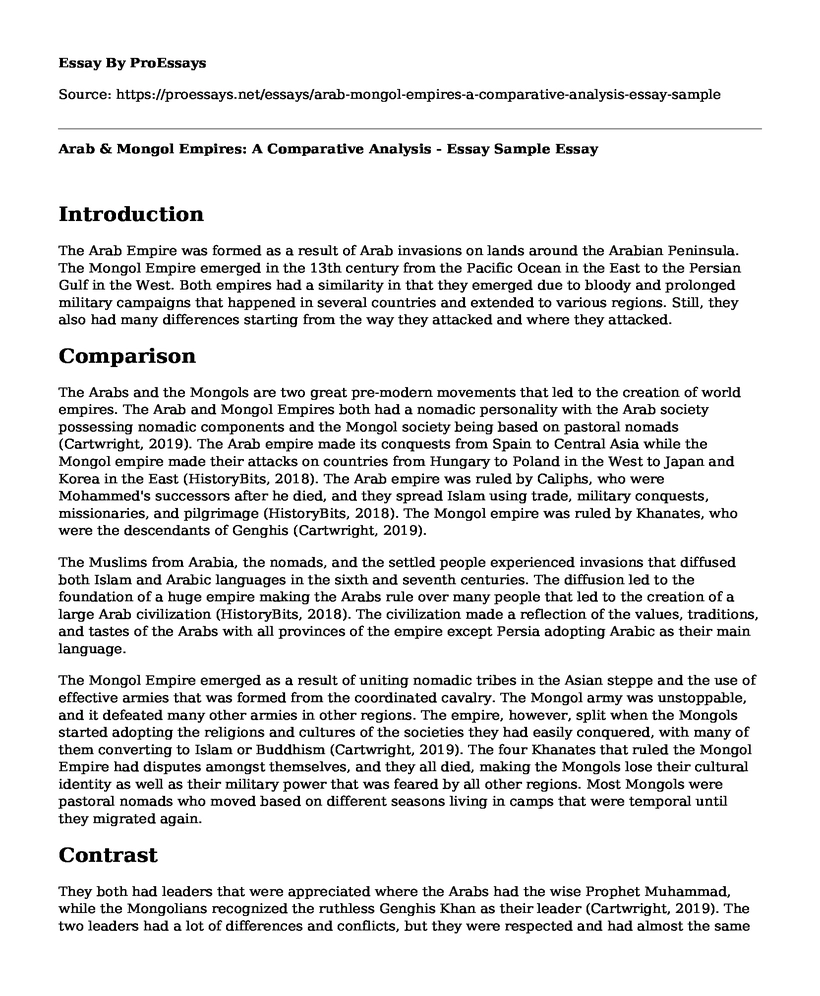Introduction
The Arab Empire was formed as a result of Arab invasions on lands around the Arabian Peninsula. The Mongol Empire emerged in the 13th century from the Pacific Ocean in the East to the Persian Gulf in the West. Both empires had a similarity in that they emerged due to bloody and prolonged military campaigns that happened in several countries and extended to various regions. Still, they also had many differences starting from the way they attacked and where they attacked.
Comparison
The Arabs and the Mongols are two great pre-modern movements that led to the creation of world empires. The Arab and Mongol Empires both had a nomadic personality with the Arab society possessing nomadic components and the Mongol society being based on pastoral nomads (Cartwright, 2019). The Arab empire made its conquests from Spain to Central Asia while the Mongol empire made their attacks on countries from Hungary to Poland in the West to Japan and Korea in the East (HistoryBits, 2018). The Arab empire was ruled by Caliphs, who were Mohammed's successors after he died, and they spread Islam using trade, military conquests, missionaries, and pilgrimage (HistoryBits, 2018). The Mongol empire was ruled by Khanates, who were the descendants of Genghis (Cartwright, 2019).
The Muslims from Arabia, the nomads, and the settled people experienced invasions that diffused both Islam and Arabic languages in the sixth and seventh centuries. The diffusion led to the foundation of a huge empire making the Arabs rule over many people that led to the creation of a large Arab civilization (HistoryBits, 2018). The civilization made a reflection of the values, traditions, and tastes of the Arabs with all provinces of the empire except Persia adopting Arabic as their main language.
The Mongol Empire emerged as a result of uniting nomadic tribes in the Asian steppe and the use of effective armies that was formed from the coordinated cavalry. The Mongol army was unstoppable, and it defeated many other armies in other regions. The empire, however, split when the Mongols started adopting the religions and cultures of the societies they had easily conquered, with many of them converting to Islam or Buddhism (Cartwright, 2019). The four Khanates that ruled the Mongol Empire had disputes amongst themselves, and they all died, making the Mongols lose their cultural identity as well as their military power that was feared by all other regions. Most Mongols were pastoral nomads who moved based on different seasons living in camps that were temporal until they migrated again.
Contrast
They both had leaders that were appreciated where the Arabs had the wise Prophet Muhammad, while the Mongolians recognized the ruthless Genghis Khan as their leader (Cartwright, 2019). The two leaders had a lot of differences and conflicts, but they were respected and had almost the same character traits in treating their people (HistoryBits, 2018). Both leaders were considerate of their people as they were wise and loyal with the same thoughts of their empires, where they wanted to ensure that their people had the best lives with little to no wars.
Both of their actions were influenced by religion, which united each member of the different empires. They also made substantial technological advances with military equipment being common amongst them. Inhabitants of the Mongol and Arab empires made significant advances in technology, especially in their weaponry, with the Mongols inventing the bows and arrows. In contrast, the Arabs invented shields and swords (Cartwright, 2019). They also both used technology to develop their places of worship. The Mongols made idols and statues that they paid tribute to while the Arabs built mosques to use as places of worship (HistoryBits, 2018).
References
Cartwright, M. (2019, November 11). Mongol Empire. https://www.ancient.eu/Mongol_Empire/
HistoryBits. (2018). The Arab Empire. https://www.historybits.com/arab-empire.htm
Cite this page
Arab & Mongol Empires: A Comparative Analysis - Essay Sample. (2023, May 04). Retrieved from https://proessays.net/essays/arab-mongol-empires-a-comparative-analysis-essay-sample
If you are the original author of this essay and no longer wish to have it published on the ProEssays website, please click below to request its removal:
- Why Does Empire Need Both Corruption and Generation? Essay Example
- Current United States Congress Essay
- Abraham Lincoln, Slavery and the American Civil War Essay
- Essay on Tiger Woods: Youngest Pro Golfer, First African-American US Masters Winner
- Paper Example on John Conrad: From Congo to Victorian Scholar
- Essay Sample on Alexander the Great: Conqueror of Ancient Empires
- Essay Example on Voting in US: From Early 1800s to Recent Elections







